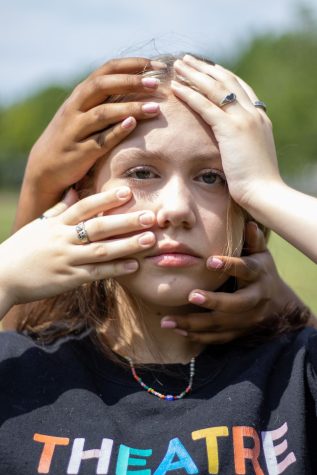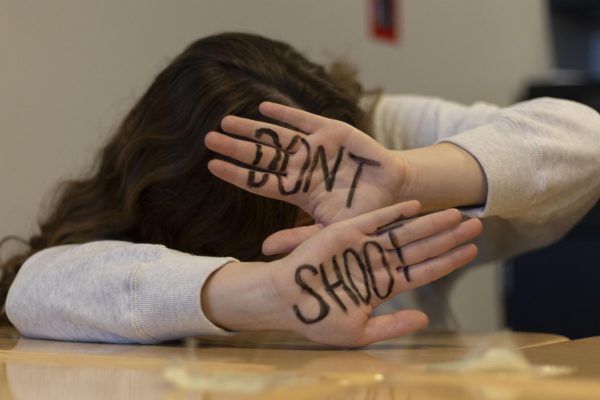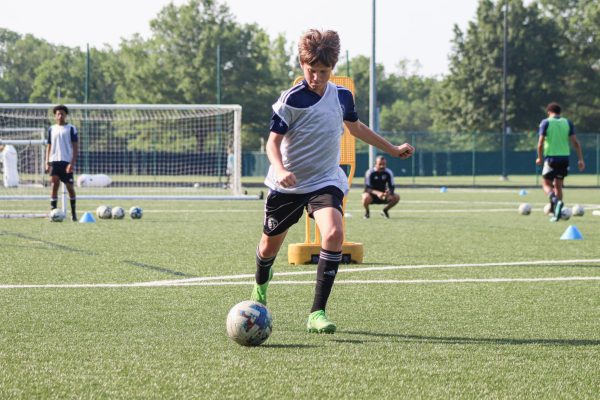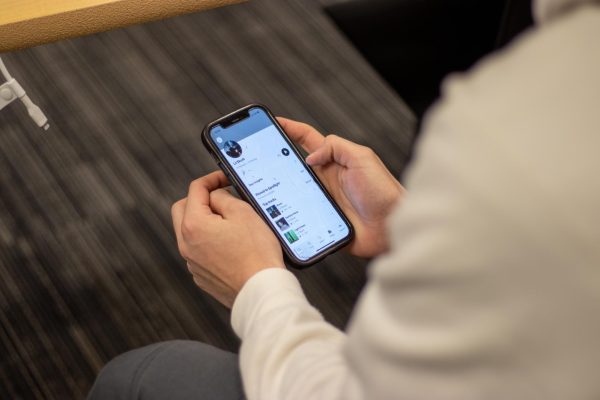Finding the right fit
Students share the stories of why they quit their former passions due to insecurities and newfound interests.
Insecurity and the fear of failing can be enough for someone to quit doing something they love, sophomore Addison Novak said she experienced this with basketball.
“I’ve always been getting down on myself about not feeling good enough,” Novak said. “It doesn’t matter what team I’m on, even if I was on the best team, I would still get down on myself about a lot of things.”
This feeling, Novak said, along with other stress in her life, led her to quit basketball.
“I was struggling with the pressure of an online class, things in my personal life and basketball especially,” Novak said. “[Basketball] was the number one stressor. Everything was boiling up and I had to make the decision to give something up, so I decided that it was time to quit basketball.”
Though she knew it was time to move on, Novak said this decision was not easy.
“I’ve been doing it since second grade, and I’ve always loved watching and playing basketball,” Novak said. “It’s a sport that I loved, and it was really tough to give it up.”
Although quitting activities due to fear or insecurity is a common occurrence, junior Hannah Hatton posed the idea to push through those doubts and quit only if there is a chance to find something you are more passionate about. Hatton’s decision to quit dance, after 10 years of participation, resembles this idea.
“I quit dance to join theater, and I think if I didn’t have to spend so much time on theater, I would have been able to stick with it,” Hatton said. “I became so in love with theater I realized that was what I needed to spend my time doing.”
Similarly, junior Grace Schlueter left figure skating in order to make time for activities she is more passionate about, such as choir.
“I got kind of bored of it, so I just didn’t really go all the time and I made myself busy with other things,” Schlueter said. “I started getting more involved in choir and voice lessons, so on Saturdays I had contests or all-state choir [and I started] working more.”
Although time and motivation were her main deciding factors, Schlueter said she did face insecurity when figure skating, due to her age and late start.
“Since I started so late and I was not doing it competitively, I wasn’t really taking it that seriously at shows and stuff,” Schlueter said. “There would be people younger than me that were way more skilled than I was [and] that was kind of weird.”
Schlueter’s mom, Susan Paris, also noticed this insecurity and how it affected her daughter.
“She saw the girls her age doing a lot more, and because Grace wasn’t able to dedicate the long hours and intense practice times, she wasn’t able to be at the same level as her peers,” Paris said. “So [skating] didn’t give her the drive to continue on.”
Like Schlueter, Hatton said she did experience some insecurity that pushed her away from dance, however for her it was related to body image and mental health.

“A lot of the girls on my team were just naturally very skinny,” Hatton said. “Having to hang out in a room of 20 girls and be required to wear tight leotards, it really was just hurting my mental health. I realized it was not a good space for me.”
Looking back, Hatton said she does not regret leaving dance because she found theater. While she said she is more passionate about theater, she did face challenges directly after her decision to quit.
“In some ways there were some negative changes [in my life] because for a couple years I had that fear of missing out,” Hatton said. “I would see, on social media, all my friends from dance doing all these cool things and hanging out together and having fun.”
Although she did encounter some initial regret, Hatton said she now feels secure with her decision and would tell her past self to take the leap, as it ended up benefiting her greatly.
“I would tell myself that even though it might seem like a huge step, it is absolutely worth it,” Hatton said. “You are going to find something that is really your life’s purpose and something that you want to be doing forever.”
Similarly to Hatton, Novak said the months following her decision were difficult but she still felt certain in leaving the sport.
“It was hard in the coming months when my friends were telling me about how I should have stayed on the team and [saying] ‘it’s so fun,’” Novak said. “But overall, I’m good with my decision. It was just difficult hearing my friends talk about it.”
Unlike Hatton and Novak, Schlueter said she did not feel regret at any point about her decision.
“If anything, I feel like I have more time to balance everything that I am doing because it’s one less thing to worry about,” Schlueter said.
Although Schlueter did not experience regret, she said her parents initially influenced her to continue skating.
“My mom wanted me to keep doing it, so I explained to her that I don’t have time or any motivation to do it,” Schlueter said. “My dad really wanted me to do it too. It was harder to convince him that I wanted to quit at first.”
However, Paris said she just wanted Schlueter to do what makes her happy.
Hatton said her family also influenced her to continue dancing, but she decided to follow through with her decision to quit regardless.
“My family always talked about how much they loved watching me dance,” Hatton said. “But then I realized that I needed to be doing it for myself and I would rather just do theater.”
Novak said not only was her family supportive of her decision, but her teachers assisted her through the process of leaving basketball as well.
“[My teachers] were people who I could confide in and they really helped me through it,” Novak said. “Of course they were encouraging me to stick with it, but they also always heard me out and they were there for me when I decided to quit.”
If you are thinking about giving something up, purely because of insecurity or fear, Hatton said, you should try to push through. But sometimes, leaving behind whatever is negatively impacting you, can lead to the discovery of something better.
“If being there makes you feel bad about yourself, then you should find something that makes you feel good about yourself,” Hatton said.
Paris said she recommends weighing your options of whether to stay with your sport or move on. Along with making this choice, Paris said that it is important to have the courage to make the decision that is truly right for your life.
“Be brave enough to try different things and be brave enough to be able to say ‘OK, this sport is not for me. It’s not mentally healthy for me. It causes more distress than happiness and pleasure,” Paris said.
Novak added to this, emphasizing the importance of doing whatever is right for you instead of trying to stick with every activity.
“No person can be successful at everything, and it’s okay to say no,” Novak said. “Sometimes it’s okay to choose yourself and to be confident in that decision, even if it’s a hard one to make.”
Similarly, Schlueter said if you love what you are doing, you should not take others’ opinions to heart.
“I would say don’t care about what other people think, I know that’s really difficult because every single teenager thinks that, but if you’re passionate about it, just keep pushing through and doing what you love,” Schlueter said. “If you love it, why should you quit?”

Lindsay Maresh is a senior. She is a writer and designer for “The Express.” This is her third year on staff. Outside of newspaper, Lindsay is involved in Student Government, KAY Club, NHS, Relay for Life, Quill & Scroll, and NEHS. In her free time, she loves to spend time with family and friends and travel. Lindsay looks forward to another year on staff and hopes to get to know new people and stories.

Reagan King is a junior and a writer for “The Express.” This is her second year on staff. Outside of newspaper, she plays varsity tennis for BVNW and is involved with Femineers. Reagan also enjoys spending time outside and biking with friends. Other notable things about Reagan are her Chipotle addiction and her love for binging shows like “Criminal Minds” and “Grey’s Anatomy.” This year she is excited to improve her writing and cover a wide variety of topics.

Norah Alasmar is a senior and the Online Photo Editor for “The Express.” This is her second year on staff. Outside of newspaper, Norah is involved in girls golf, NHS, SNHS and KAY Club. In her free time, she enjoys spending time with her friends and family, and watching her favorite shows and movies. Norah is excited to take on this role, and hopes to improve the photos distributed to our readers.









